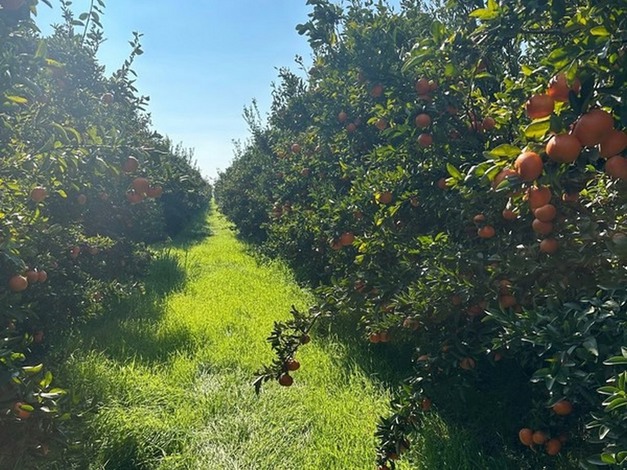Before California’s recent rains, this season’s mandarin crop was looking fairly light industry-wide. This was largely due to the alternate-bearing nature of the W. Murcott mandarins. That said, the recent rains have postponed the harvest of mandarins this week. “Companies were pushing to harvest to get ahead of that rain,” said Dieter Schellenberg of Schellenberg Farms.
The rains have kept harvesting at bay, especially in growing regions with clay soils where the water is retained for more days--regions with sandy soils got into their fields sooner.
That’s adding to the already light supply situation. “It’s tough because I’ve heard from some producers that they’re 30 percent up this year and we’re probably 30 percent down. While it varies, throughout the whole industry it seems to be lighter because of that alternate bearing,” says Schellenberg, adding that sizing is looking good though generally it’s a lot of smaller fruit. “It’s strange because the maturity seems to have come on a lot earlier than normal, maybe seven to 10 days earlier.”

The concerns over thrip
Adding to the lighter crop is also a thrip issue this season. “In this Central Valley region, many areas were hit very hard by citrus thrips. One theory is due to the heavy rain last year. It created an environment where thrip was able to multiply in grassy areas and come out of those grassy areas into orchards during bloom,” says Schellenberg. “A lot of growers had to spray very aggressively to keep on top of that and even though they did, there was a lot of damage. That’s another thing forcing down production this season.” In turn, packouts are down and there could be more choice-grade fruit available.
As for demand, it’s good and leaving market pricing strong at the moment. “I expect that to continue through the season,” he says. “I think it’s going to be a pretty normal season length but I don’t think that there’s going to be a ton of volume by late June. I think it’s going to get pretty short around April.”
He also adds that on the organic side of the mandarin business, supply may be tight in the later part of the season so the organic pricing should hold. “However organic pricing tends to ebb and flow with what the conventional pricing does. The conventional price sets the tone for the whole market and if there’s too much supply, it will end up falling for people to move fruit along in an adequate time frame,” says Schellenberg.
 For more information:
For more information:
Dieter Schellenberg
Schellenberg Farms
Tel: +1 (559) 638-7292
www.schellenbergfarms.com
